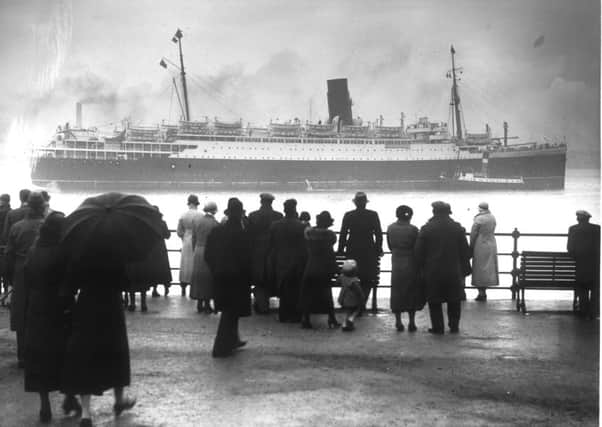Scotsman 200: Editor defies D-notice as toll rises


FRIDAY 26 JULY, 1940
Sinking of the Lancastria: 2500 Known to be Saved
Nearly 2500 are known to have been saved – and more may be in enemy hands – from a total of 5300 aboard the transport Lancastria, which, it was admitted in London yesterday, was sunk on June 17 by the enemy during the evacuation of the B.E.F. from France.
The Lancastria, a Cunard-White Star liner, was lying at St Nazaire and was about to weigh anchor when the Nazi bombers launched their attack. After half an hour’s ineffectual bombing she was hit by a salvo, took on a heavy list, capsized and sank.
Advertisement
Hide AdAs the ship went down Tommies sang “Roll out the barrel” and “There’ll always be an England.”
Women and child evacuees, of which there were a number in the ship, jumped overboard – the heavy list hampering the launching of the lifeboats – only to be machine-gunned by the raiders.
The majority of survivors were picked up small craft which were engaged in ferrying other personnel from the docks to troop-ships. Some, however, managed to swim and wade ashore in the shallow water. Two thousand four hundred and seventy-seven survivors are known to have been picked up, but it is possible that the actual number may have been larger, and that others may have made their way ashore and have fallen into enemy hands. There is great difficulty in estimating what are the exact figures in view of the difficult circumstances under which evacuation was taking place. Survivors all paid tribute to the magnificent courage displayed by the ship’s crew and all ranks at the time the ship was struck.
EDITORIAL COMMENT
The loss of the Lancastria has been revealed after some delay. A former liner, the Lancastria was being used as a troopship to evacuate British forces from France. After embarking over 5000 passengers, including a number of women and children refugees, the vessel, while still at anchor, was attacked and sunk by German aircraft. Almost 2500 were picked up, and others may have succeeded in reaching the shore, but the number of casualties must have been deplorably high. Such losses unfortunately cannot be avoided in withdrawal operations, and it may be wondered why the fate of the Lancastria was not disclosed, until a report, not altogether accurate, had appeared in the American Press. The Government have given repeated assurances that it is not their policy to conceal news of losses and reverses, since they know that the people of this country are not easily depressed by misfortunes. There is no reason to suppose that in general the Government are not fulfilling their undertaking of dealing honestly with the people in the publication of information, and there may have been special reasons for delaying the announcement of the loss of the Lancastria. Yet it is obvious that the belated release of news gives an opportunity for rumour to get busy, and to embellish facts in a sensational form. It also spreads suspicions that the Government’s policy is to tell the public what they think is good for them to know, and no more. People with an itch for news are always prone to imagine that they are being kept in the dark, and that much is happening behind the scenes. Frank and timely publication of information, good or bad, is the best antidote for gossip and distrust.
The full text of this edited extract can be found at The Scotsman Digital Archive